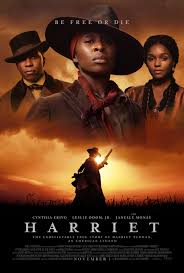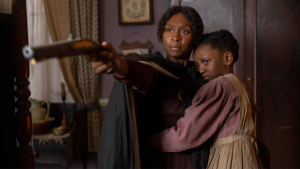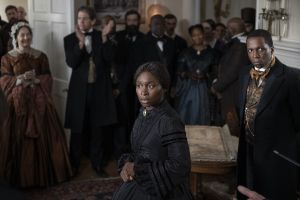Harriet (2019)
Harriet is an American drama film directed by Kasi Lemmons. He also co-wrote the screenplay with Gregory Allen Howard. The film was released in the United States on November 1, 2019, featuring Cynthia Erivo, Leslie Odom Jr., Joe Alwyn and Janelle Monáe. This film is based on the true story of Harriet Tubman. It is an extraordinary story about her escape from slavery and transformation into one of America’s greatest heroes. They His courage, creativity and tenacity liberated hundreds of slaves and changed the course of history.
This movie has received several nominations, including Cynthia Erivo's Best Actress Performance Award and Stand Up, Joshuah Brian Campbell Best original song won by Brian Campbell and Cynthia Erivo at the 2020 Golden Globe Awards.[1]
Contents
Plot
Tubman (also known as Minty) was born in slavery around 1820, has eight siblings, and lives in Dorchester County, Maryland. In her time as a slave, she was smashed to the head with a two-pound hammer by the slave owner. This was just one of the many abuses she experienced. But she was also very spiritual, she felt that God had already spoken to her. In 1849, after the death of the master, Tubman decided Fleeing slavery because of fear that he might be separated from his family. When her two brothers first set off with her, when Tubman's master sent an escape letter and rewarded them, they became ruthless. This allowed Tubman to embark on the road of independence alone. However, human rights activists have learned about the mysterious underground railway and have taken a 90-mile journey of freedom with the help of people actively engaged in the abolition of slavery.
The former slave finally arrived in Philadelphia, but after working and saving some money, she decided to return home. In the end, Tubman not only rescued her relatives, but also thousands of others. After passing the Fugitive Slave Act, it became possible to recapture the newly released slaves, and Tubman also reconfigured the underground railway course. With the liberation of former slaves, Tubman donated to the Civil War and served as a cook and nurse for the Union Army. Despite this, she was a traitor and continued to help free slaves throughout the war.[2]
In the last scene of the movie, Harriet is seen taking care of her family, leading 150 black soldiers to Combahee River Raid and freeing hundreds of slaves. Some of her achievements are outlined at the end of the film: she personally freed more than 70 slaves on the Underground Railway, returned as an Union spy after the Civil War, and led 150 black soldiers to free more than 750 slaves. She passed away at the age of 91, her last words were "I will prepare a place for you"
Black Empowerment
Simran Hans on Theguardian.com it was remakable slavery biopic without showing pain, trauma and humiliation. "Though the film is about the atrocity of slavery, Lemmons and co-writer Gregory Allen Howard (Remember the Titans) focus on liberation and solidarity, rather than amplifying pain, trauma and humiliation. So often, historical films are stale and mired in misery, but Harriet has a rare buoyancy."[3]
Rex Reed on Observer.com give 3.5 stars out of 4. "With enough terror to satisfy modern audiences and enough underplayed plot movement to save it from conventional biopic trajectory, Harriet holds interest and invites respect. It is still not the great Civil War epic it could have been, but it’s solid enough to work, and Cynthia Erivo’s valiant and committed performance is a wonderful achievement."[4]
The power and lyrical enthusiasm of the director Kasi Lemmons made this historical drama the product of Harriet Tubman's escape from slavery and his cooperation with the Underground Railway. This is secularism. The sublime influence of the text.[5]
Controversy
Harriet biopic erases white violence – and that's a big problem
Jill Roby on Digitalspy.com think that there is a lot of white violence in the real story but can't be seen in the film. "The most violence that is shown on the screen isn't from the overseers who kept slaves in line, or even from the masters who owned them. White violence is only alluded to, But we never actually see the violence happen"[6]
Harriet as faced a lot of backlash from the black community as a "white savior"
“I swear the whole point of this Harriet movie is to restart the ‘Black men ain’t never cared about Black women’ narrative rather than tell Harriet’s story. An abomination. #NotMyHarriet,@BreakingBrown tweeted. [7]
“At the end of Harriet, she forgives the white man who was her slavemaster while she kills the Black man. In one sweep this film is saying forgive the white man but hate and never forgive the Black Man. Most anti Black movie ever made in 2019,”@BlackGlobeVilla.[8]
The stars is not American
Some people say they are upset because the movie star Cynthia Erivo (Cynthia Erivo) is an English actress of Nigerian descent, not a descendant of enslaved women in the United States. Others are angry that Erivo insulted the so-called "ghetto accent" on Twitter six years ago.[9]
Reference
- ↑ https://www.goldenglobes.com/film/harriet
- ↑ https://www.hollywoodreporter.com/news/true-story-harriet-how-accurate-are-characters-1253182
- ↑ https://www.theguardian.com/film/2019/nov/24/harriet-review-harriet-tubman-biopic-cynthia-erivo-janelle-monae
- ↑ https://observer.com/2019/11/harriet-review-cynthia-erivo-rex-reed/
- ↑ https://www.newyorker.com/goings-on-about-town/movies/harriet
- ↑ https://www.digitalspy.com/movies/a29871460/harriet-tubman-review-violence-slavery/
- ↑ https://twitter.com/BreakingBrown/status/1189919145321811970
- ↑ https://twitter.com/BlackGlobeVilla/status/1190362598715379714?s=20
- ↑ https://whyy.org/articles/why-would-some-black-audiences-boycott-the-new-harriet-tubman-movie/


